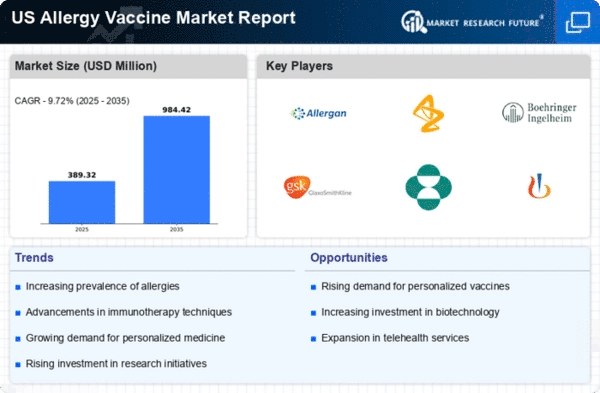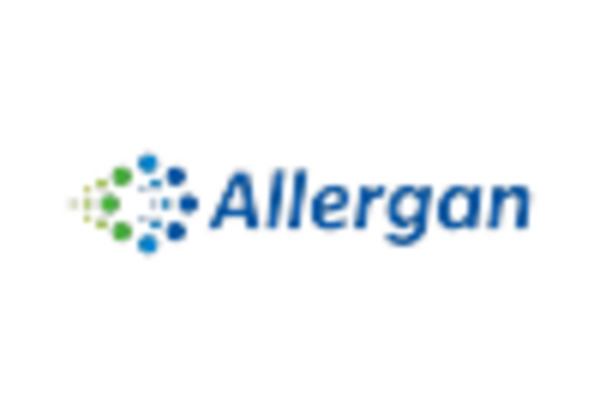Growing Allergy Prevalence
The increasing prevalence of allergies in the US population is a primary driver for the allergy vaccine market. Recent studies indicate that approximately 30-40% of adults and 40% of children in the US suffer from allergic conditions. This rising incidence creates a substantial demand for effective treatment options, including vaccines. As more individuals seek relief from allergy symptoms, the market for allergy vaccines is expected to expand. The allergy vaccine market is likely to benefit from this trend, as healthcare providers and pharmaceutical companies focus on developing innovative solutions to address the growing burden of allergies. Furthermore, the economic impact of allergies, which costs the US healthcare system billions of dollars annually, underscores the urgency for effective interventions, thereby propelling the allergy vaccine market forward.
Increased Healthcare Expenditure
The rising healthcare expenditure in the US is a significant driver for the allergy vaccine market. With healthcare spending projected to reach approximately $6 trillion by 2027, there is a growing focus on preventive care and innovative treatments. This trend is likely to encourage investments in the allergy vaccine market, as healthcare providers and insurers recognize the long-term cost benefits of vaccination over chronic allergy management. The allergy vaccine market stands to gain from this shift, as more patients are likely to seek vaccination as a proactive measure against allergies. Additionally, government initiatives aimed at improving access to healthcare services may further bolster the market, making allergy vaccines more accessible to a broader population.
Supportive Regulatory Environment
A supportive regulatory environment is fostering growth in the allergy vaccine market. Regulatory agencies in the US are increasingly recognizing the importance of innovative therapies for allergy management. Streamlined approval processes and incentives for research and development are encouraging pharmaceutical companies to invest in allergy vaccine development. The allergy vaccine market benefits from this regulatory support, as it facilitates faster access to new treatments for patients. Additionally, initiatives aimed at promoting public health and reducing the burden of allergic diseases are likely to enhance the market's growth prospects. As regulatory frameworks continue to evolve, the allergy vaccine market is expected to thrive, with new products entering the market to meet the needs of an expanding patient population.
Rising Demand for Personalized Medicine
The trend towards personalized medicine is reshaping the landscape of the allergy vaccine market. Patients are increasingly seeking tailored treatment options that address their specific allergy profiles. This shift is prompting pharmaceutical companies to invest in research that focuses on developing personalized allergy vaccines. The allergy vaccine market is likely to see a rise in products that cater to individual patient needs, enhancing treatment efficacy and patient satisfaction. Furthermore, advancements in genetic testing and biomarker identification are facilitating the development of customized vaccines, which could revolutionize the way allergies are treated. As the demand for personalized healthcare solutions continues to grow, the allergy vaccine market is expected to expand in response to these evolving patient preferences.
Technological Advancements in Vaccine Development
Technological advancements in vaccine development are significantly influencing the allergy vaccine market. Innovations such as recombinant DNA technology and adjuvant formulations are enhancing the efficacy and safety profiles of allergy vaccines. These advancements allow for the creation of more targeted therapies that can provide long-lasting relief from allergic reactions. The allergy vaccine market is witnessing a surge in research initiatives aimed at harnessing these technologies, which could lead to the introduction of novel vaccines. Moreover, the integration of artificial intelligence in vaccine research is streamlining the development process, potentially reducing timeframes and costs. As a result, the allergy vaccine market is poised for growth, with new products expected to emerge that cater to the specific needs of patients suffering from various allergies.
















